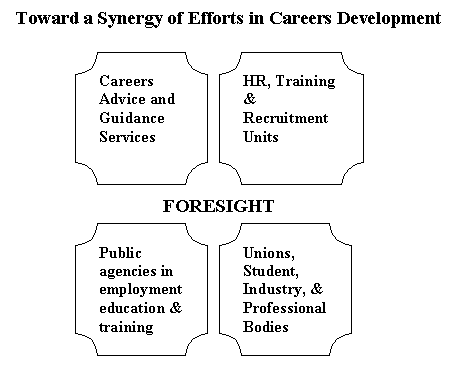





 Biotechnology Pilot Biotechnology Pilot
 ICT Pilot ICT Pilot
 Marine Pilot Marine Pilot
 CompetitiveMalta CompetitiveMalta
 CompetitiveCareers CompetitiveCareers
 FutureChild Initiative FutureChild Initiative
 MCST MCST










|
|
 |
CompetitiveCareers
eForesee Action Briefing 1
Awareness and Training Workshop on Foresight for CompetitiveCareers in the Knowledge Economy
Malta
This is the first in the series of Action Briefings which are aimed at taking the recommended actions lines emerging from the eFORESEE Malta first pilot on Exploring Knowledge Futures into action. This first event will focus on a priority topic for Malta: Careers for Competitiveness in the Knowledge Economy and how foresight can prove an effective tool in improving the take-up of careers at all levels of the knowledge economy. The event will take the form of a combined awareness and training activity where some examples of best practice will be provided and this will be followed by practical sessions on developing foresight approaches to careers planning and development.
The event is targeting primarily senior persons providing careers advice and guidance in higher education and other institutions, key government staff development offices, representatives of HR departments in major corporations, the national agency responsible for employment and training, industry, unions and student representative bodies.

The Workshop has the following underlying aims:
- To improve the delivery of careers advice and guidance services by introducing the use of foresight approaches in careers planning and development. Foresight's emphasis on a more long-term exploratory perspective to decisions being taken now, lends itself to the task of careers planning. In this respect, this initiative aims to encourage young people and careers advisors to work more closely together and with prospective employers and representative bodies in designing and planning for competitive careers. This can be encouraged through the use of foresight as an important tool for providing careers guidance and improving professional practice. The aim is also to expose careers advisers to foresight outcomes so that they are aware of likely future labour market needs.
- To encourage foresight embedding in young people so that they can take wiser decisions about their careers through more in-depth exploration of future career opportunities. It is also aimed at empowering young people to expect more from their careers and future employers.
- To encourage recruitment and training managers in the public and private sectors to provide more competitive, attractive careers to young people. The aim is also to promote lifelong learning as a tool for achieving competitiveness and staying competitive.
- To encourage representative bodies for industry, workers, students and the professional bodies to play a more proactive role in setting standards for careers for competitiveness.
Following on from the recent International Conference on a National Competitiveness Strategy for Malta (26-28 May 2003), a core aim of this workshop is to promote competence at all levels in the public and private sectors. This is in recognition of the fact that the country's competitiveness depends on recruitment based on competence. It is vitally important that the country's education and training system guides the most competent people to these posts.
The First session will focus on examples of Best Practice from Europe:
- UK: University of Manchester's Careers Service
- Finland
- Ireland
The follow-up sessions will feature:
- demonstrations of foresight methods and tools; and
- practical sessions involving the use of foresight in designing effective long-term career development strategies
What is Foresight?
(Extract from the FOREN : A Practical Guide to Regional Foresight, 2001 eds. JRC IPTS, PREST, CMI International and Sviluppo Italia. FOREN was an EU funded FP5 STRATA Project. Download the Guide from http://eforesee.info/files/general/foren-manual.pdf. Country-specific versions of the Guide are now also available - work on a Malta Guide is currently underway - for more information contact Jennifer Cassingena-Harper).
Foresight is a systematic, participatory, future-intelligence-gathering and medium- to long-term vision-building process aimed at present-day decisions and mobilising joint actions. Foresight arises from a convergence of trends underlying recent developments in the fields of 'policy analysis', 'strategic planning' and 'future studies'. It brings together key agents of change and various sources of knowledge in order to develop strategic visions and anticipatory intelligence.
Regional Foresight is the implementation of the five essential elements of Foresight:
- anticipation
- participation
- networking
- vision
- action
at a reduced territorial scale where proximity factors become determinant.
Foresight can be applied to a huge range of topics (scientific, industrial, demographic, social, political, cultural factors). While it can be used to inform policymaking, build networks, and enhance local capabilities for tackling long-term issues it is not a magic solution that can solve all social, economic or political problems of regions.
Foresight is a very evocative label for the rise to prominence of participative methods and long-term strategic futures techniques, in the wake of more traditional ways of informing policy planning. It is currently highly-topical, but whether or not the label persists is irrelevant to the real trends which are radically changing delivery-timescale and format requirements for information on future threats and opportunities which decision-makers require. Foresight, as a means to an end, is well adapted to these changing requirements. It has proven itself at national level, and has begun to do so too at regional and other territorial levels.
Common features of Foresight include:
- a long-term orientation, the examination of a wide range of factors,
- the drawing on widely-distributed knowledge,
- the institutionalisation and creation of networks and the use of formal techniques/ methods.
Why Foresight for CompetitiveCareers?
We have identified at least four groups of stakeholders in the context of CompetitiveCareers: Careers Advice and Guidance Services, HR, Training & Recruitment Units, Public agencies in employment education & training and Unions, Student, Industry, & Professional Bodies. Each of these groups develops its strategies and approaches to careers, recruitment, training and employment, largely independently of the others.
Foresight can make some important contributions to the development of CompetitiveCareers by:
- encouraging wider processes of open consultation whereby all the players are brought together to explore how approaches can be improved and good practices identified through networking with counterparts abroad;
- allowing for the exploration of more long-term scenarios in careers development and planning
- providing the forum for networking between the key players which can evolve into the development of an ongoing dialogue
- as these networks mature, the foresight venture can enter into an implementation phase where the commitment of the stakeholders is reflected in the institutionalization of links and the pooling of resources for joint activities.
 
|
![]() AcrossLimits.
AcrossLimits.



